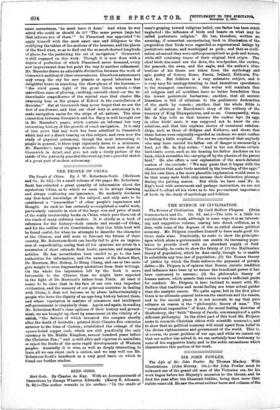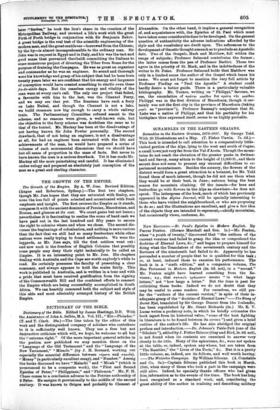SIR JOHN FOWLER
The Life of Sir John Fowler. By Thomas Mackay. With Illustrations. (John Murray. 16s.)—Sir John Fowler must be reckoned one of the grand old men of the Victorian era, for his work began before her Majesty's accession to the throne, and he died the year after the Diamond Jubilee, being then more than eighty veara old. He saw the irreat railway boom and collapse of the later "forties," he took the lion's share in the creation of the Metropolitan Railway, and crowned a life's work with the great Firth of Forth bridge in conjunction with Sir Benjamin Baker. A great bridge is the real test of the scientific engineering of the modern man, and the great cantilever—borrowed from the Chinese, by the by—is almost incomprehensible to the ordinary man. Sir John was in request in Egypt and in Italy, and his was the tact and good sense that prevented Garibaldi committing the Italians to some monstrous project of diverting the Tiber from Rome for the purpose of draining the Campagna. He was as great an organiser and commander as he was an engineer. So sound and thorough were his knowledge and grasp of his subject that had he been born twenty years later we are confident that his energy and largeness of conception would have created something to startle even these fin-de-siecle days. But the ceaseless energy and vitality of the man were at every one's call. The only one project that failed, a favourite with him to the last, was the Channel Ferry, and we may see that yet. The Russians have such a ferry on Lake Baikal, and though the Channel is not a lake, we build steamers now big enough to carry a whole railway train. The Parliamentary Committee refused assent to the scheme, and no reasons were given, a well-known rule, but the objection to the ferry scheme was doubtless the same as to that of the tunnel. Mr. Mackay has been at the disadvantage of not having known Sir John Fowler personally. The second drawback, that of not being an engineer, is not a disadvantage at all, for had an engineer been entrusted with the life and achievements of the man, he would have prepared a series of volumes of such monumental dimensions that we should have lost all sense of proportion in the mass of facts. But never to have known the man is a serious drawback. Yet it has made Mr. Mackay all the more painstaking and careful. It has eliminated undue eulogy and prepared an absolutely just conception of the man as a great and sterling character.























































 Previous page
Previous page